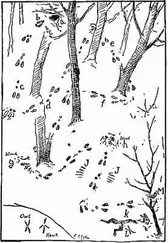Ernest Seton - Rolf in the Woods
Здесь есть возможность читать онлайн «Ernest Seton - Rolf in the Woods» весь текст электронной книги совершенно бесплатно (целиком полную версию без сокращений). В некоторых случаях можно слушать аудио, скачать через торрент в формате fb2 и присутствует краткое содержание. Год выпуска: 1997, Жанр: Приключения про индейцев, Исторические приключения, на английском языке. Описание произведения, (предисловие) а так же отзывы посетителей доступны на портале библиотеки ЛибКат.
- Название:Rolf in the Woods
- Автор:
- Жанр:
- Год:1997
- ISBN:нет данных
- Рейтинг книги:3 / 5. Голосов: 1
-
Избранное:Добавить в избранное
- Отзывы:
-
Ваша оценка:
- 60
- 1
- 2
- 3
- 4
- 5
Rolf in the Woods: краткое содержание, описание и аннотация
Предлагаем к чтению аннотацию, описание, краткое содержание или предисловие (зависит от того, что написал сам автор книги «Rolf in the Woods»). Если вы не нашли необходимую информацию о книге — напишите в комментариях, мы постараемся отыскать её.
Rolf in the Woods — читать онлайн бесплатно полную книгу (весь текст) целиком
Ниже представлен текст книги, разбитый по страницам. Система сохранения места последней прочитанной страницы, позволяет с удобством читать онлайн бесплатно книгу «Rolf in the Woods», без необходимости каждый раз заново искать на чём Вы остановились. Поставьте закладку, и сможете в любой момент перейти на страницу, на которой закончили чтение.
Интервал:
Закладка:
Rolf knew how to travel now; he began softly. At a long, easy stride he went for half an hour, then at a swinging trot for a mile or two. Five miles an hour he could make, but there was one great obstacle to speed at this season—every stream was at flood, all were difficult to cross. The brooks he could wade or sometimes could fell a tree across them, but the rivers were too wide to bridge, too cold and dangerous to swim. In nearly every case he had to make a raft. A good scout takes no chances. A slight raft means a risky passage; a good one, a safe crossing but loss of time in preparations. Fifteen good rafts did Rolf make in that cross-country journey of three days: dry spruce logs he found each time and bound them together with leather-wood and withes of willow. It meant a delay of at least an hour each time; that is five hours each day. But the time was wisely spent. The days were lengthening; he could travel much at dusk. Soon he was among settlements. Rumours he got at a settler's cabin of Sir George Prevost's attack on Sackett's Harbour and the gallant repulse and at morning of the fourth day he came on the hill above Sackett's Harbour—the same hill where he had stood three months before. It was with something like a clutching of his breath that he gazed; his past experiences suggested dreadful thoughts but no—thank God, "Old Glory" floated from the pole. He identified himself to the sentinels and the guard, entered the fort at a trot, and reported at headquarters.
There was joy on every side. At last the tide had turned. Commodore Chauncey, after sweeping Lake Ontario, had made a sudden descent on York (Toronto now) the capital of Upper Canada, had seized and destroyed it. Sir George Prevost, taking advantage of Chauncey's being away, had attacked Sackett's Harbour, but, in spite of the absence of the fleet, the resistance had been so vigorous that in a few days the siege was abandoned.
There were shot holes in walls and roofs, there were a few wounded in the hospital, the green embankments were torn, and the flag-pole splintered; but the enemy was gone, the starry flag was floating on the wind, and the sturdy little garrison filled with a spirit that grows only in heroes fighting for their homes.
How joyfully different from Ogdensburg.
Chapter 72.
Scouting Across Country
That very night, Rolf turned again with the latest news and the commandant's reports.
He was learning the country well now, and, with the wonderful place-memory of a woodman, he was able to follow his exact back trail. It might not have been the best way, but it gave him this advantage—in nearly every case he was able to use again the raft he had made in coming, and thereby saved many hours of precious time.
On the way out he had seen a good many deer and one bear, and had heard the howling of wolves every night; but always at a distance. On the second night, in the very heart of the wilderness, the wolves were noisy and seemed very near. Rolf was camping in the darkness. He made a small fire with such stuff as he could find by groping, then, when the fire blazed, he discovered by its light a dead spruce some twenty yards away. Taking his hatchet he went toward this, and, as he did so, a wolf rose up, with its forefeet on a log, only five yards beyond the tree and gazed curiously at him. Others were heard calling; presently this wolf raised its muzzle and uttered a long smooth howl.
Rolf had left his pistol back at the fire; he dared not throw his hatchet, as that would have left him unarmed. He stooped, picked up a stick, and threw that; the wolf ducked so that it passed over, then, stepping back from the log, stood gazing without obvious fear or menace. The others were howling; Rolf felt afraid. He backed cautiously to the fire, got his pistol and came again to the place, but nothing more did he see of the wolf, though he heard them all night and kept up two great fires for a protection.
In the morning he started as usual, and before half an hour he was aware of a wolf, and later of two, trotting along his trail, a few hundred yards behind. They did not try to overtake him; indeed, when he stopped, they did the same; and when he trotted, they, true to their dog-like nature, ran more rapidly in pursuit. How Rolf did wish for his long rifle; but they gave no opportunity for a shot with the pistol. They acted, indeed, as though they knew their safe distance and the exact range of the junior gun. The scout made a trap for them by stealing back after he had crossed a ridge, and hiding near his own trail. But the wind conveyed a warning, and the wolves merely sat down and waited till he came out and went on. All day long these two strange ban dogs followed him and gave no sign of hunger or malice; then, after he crossed a river, at three in the afternoon, he saw no more of them. Years after, when Rolf knew them better, he believed they followed him out of mild curiosity, or possibly in the hope that he would kill a deer in which they might share. And when they left him, it was because they were near the edge of their own home region; they had seen him off their hunting grounds.
That night he camped sixty miles from Ticonderoga, but he was resolved to cover the distance in one day. Had he not promised to be back in a week? The older hands had shaken their heads incredulously, and he, in the pride of his legs, was determined to be as good as his promise. He scarcely dared sleep lest he should oversleep. At ten he lay down. At eleven the moon was due to rise; as soon as that was three hours high there would be light enough, and he proposed to go on. At least half a dozen times he woke with a start, fearing he had overslept, but reassured by a glance at the low-hung moon, he had slumbered again.
At last the moon was four hours high, and the woods were plain in the soft light. A horned owl "hoo-hoo-ed," and a far-off wolf uttered a drawn-out, soft, melancholy cry, as Rolf finished his dried meat, tightened his belt, and set out on a long, hard run that, in the days of Greece, would have furnished the theme of many a noble epic poem.
No need to consult his compass. The blazing lamp of the dark sky was his guide, straight east his course, varied a little by hills and lakes, but nearly the crow-flight line. At first his pace was a steady, swinging stride; then after a mile he came to an open lake shore down which he went at a six-mile trot; and then an alder thicket through which his progress was very slow; but that soon passed, and for half a mile he splashed through swamps with water a foot deep: nor was he surprised at length to see it open into a little lake with a dozen beaver huts in view. "Splash, prong" their builders went at his approach, but he made for the hillside; the woods were open, the moonlight brilliant now, and here he trotted at full swing as long as the way was level or down, but always walked on the uphill. A sudden noise ahead was followed by a tremendous crashing and crackling of the brush. For a moment it continued, and what it meant, Rolf never knew or guessed.
"Trot, trot," he went, reeling off six miles in the open, two or perhaps three in the thickets, but on and on, ever eastward. Hill after hill, swamp after swamp, he crossed, lake after lake he skirted round, and, when he reached some little stream, he sought a log bridge or prodded with a pole till he found a ford and crossed, then ran a mile or two to make up loss of time.
Tramp, tramp, tramp, and his steady breath and his steady heart kept unremitting rhythm.
Chapter 73.
Rolf Makes a Record
Twelve miles were gone when the foreglow—the first cold dawn-light showed, and shining across his path ahead was a mighty rolling stream. Guided by the now familiar form of Goodenow Peak he made for this, the Hudson's lordly flood. There was his raft securely held, with paddle and pole near by, and he pushed off with all the force of his young vigour. Jumping and careening with the stream in its freshet flood, the raft and its hardy pilot were served with many a whirl and some round spins, but the long pole found bottom nearly everywhere, and not ten minutes passed before the traveller sprang ashore, tied up his craft, then swung and tramped and swung.
Читать дальшеИнтервал:
Закладка:
Похожие книги на «Rolf in the Woods»
Представляем Вашему вниманию похожие книги на «Rolf in the Woods» списком для выбора. Мы отобрали схожую по названию и смыслу литературу в надежде предоставить читателям больше вариантов отыскать новые, интересные, ещё непрочитанные произведения.
Обсуждение, отзывы о книге «Rolf in the Woods» и просто собственные мнения читателей. Оставьте ваши комментарии, напишите, что Вы думаете о произведении, его смысле или главных героях. Укажите что конкретно понравилось, а что нет, и почему Вы так считаете.




